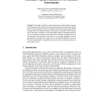47 search results - page 4 / 10 » Using opponent models for efficient negotiation |
127
click to vote
CIA
2006
Springer
15 years 6 months ago
2006
Springer
Abstract. We adopt the Markov chain framework to model bilateral negotiations among agents in dynamic environments and use Bayesian learning to enable them to learn an optimal stra...
122
click to vote
AAAI
2007
15 years 4 months ago
2007
This paper introduces an innovative approach for automated negotiating using the gender of human opponents. Our approach segments the information acquired from previous opponents,...
123
click to vote
MAGS
2008
15 years 2 months ago
2008
This paper presents a decentralized model that allows self-interested agents to reach "win-win" agreements in a multi-attribute negotiation. The model is based on an alt...
161
click to vote
ECWEB
2010
Springer
15 years 14 days ago
2010
Springer
Traditional negotiation, conducted face-to-face and via mail or telephone, is often difficult to manage, prone to misunderstanding, and time consuming. Automated negotiation promis...
131
click to vote
ATAL
2010
Springer
15 years 3 months ago
2010
Springer
Planning how to interact against bounded memory and unbounded memory learning opponents needs different treatment. Thus far, however, work in this area has shown how to design pla...

